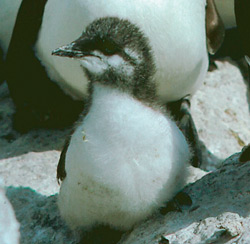Wanless S, Harris MP, Redman P, Speakman JR
Low energy prey cause North Sea seabird failures
Many seabirds in the North Sea feed on high-lipid fish such as lesser sandeels or sprats during the breeding season. In 2004 unprecedented breeding failures were recorded at many seabird colonies bordering the North Sea. Sarah Wanless, Mike Harris, Paula Redman and John Speakman used demographic, dietary and behavioural data from a long-term study of common guillemots to investigate the cause of the failures. The authors found that guillemots on the Isle of May had greatly reduced breeding success and those chicks that did survive left the colony severely underweight. Surprisingly, the calculated daily food intake of chicks was not lower than the long-term average. However, the energy content of the fish fed to chicks was very low. The study indicates that poor food quality was the likely cause of the seabird breeding failures.
Inter-Research Science Publisher is pleased to make this Feature Article openly available for viewing by our readers.
Abstract Back to contents page Link to full PDF |
 |

